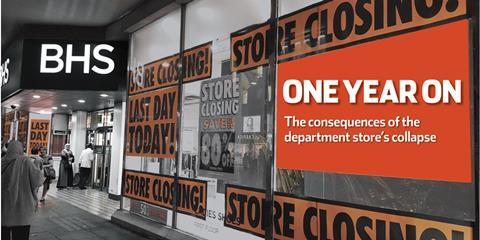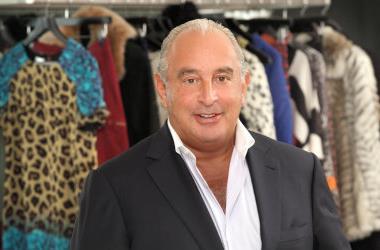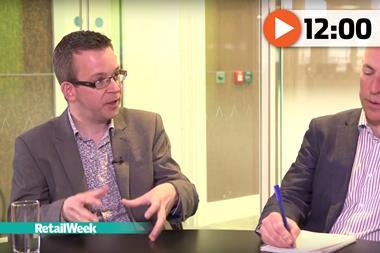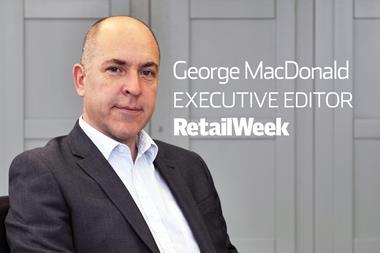The collapse of BHS had a far-reaching impact across retail and has influenced attitudes on everything from corporate governance to the future of department stores.

Pension safeguards
The fate of BHS’s pensioners, who looked likely to be big losers from the department store group’s collapse, sparked outrage and led to an inquiry by MPs.
The health of company pension schemes has come under ever more City and media scrutiny in the wake of BHS’s fall.
Although Arcadia tycoon and former BHS owner Sir Philip Green made a voluntary contribution of £363m to plug the hole in the BHS pension deficit, there have been calls for pension safeguards to be tightened and for changes to the role of the Pensions Regulator, which also faced criticism of its conduct in the BHS affair.
There have been demands, including from the Regulator, for an obligatory clearance process for some types of M&A transactions, notably when a company whose pension scheme is underfunded is sold.
In its report on BHS, the Work and Pensions Committee noted: “The future of occupational pension schemes is perhaps the greatest challenge facing longstanding British businesses.
“In an environment of rising longevity, interest rates close to zero and intense international competition, defined benefit pension liabilities accumulated in a different age can appear burdensome and unaffordable.
“It should not be forgotten that these liabilities are promises of deferred pay to employees. It is imperative that the regulatory framework does not allow sponsor companies to evade those responsibilities and, in doing so, pass the burden onto other schemes that pay the Pension Protection Fund levy.
“There may be a case for stronger and more proactive regulation.”
The Committee subsequently made a variety of proposals and is awaiting a Government response.
Private company governance
The circumstances of the sale of BHS led to calls for improved standards of governance at private companies.
Arcadia non-executive chairman Lord Grabiner faced stinging criticism for his lack of oversight of the sale of BHS by Sir Philip Green.
Described as ‘docile’ and ‘complacent’ by MPs investigating the collapse of BHS, Grabiner did not attend – and was apparently not aware of – a meeting at which the sale to Dominic Chappell was approved.
He was accused of bringing a “veneer of establishment credibility” to his role, rather than challenging the forceful Green.
The Work and Pensions Committee has urged the Government to force private companies to adhere to the Financial Reporting Council’s orporate governance code.
That would mean large private companies – or those with more than 5,000 defined benefit pension scheme members – would have to meet the same standards as their publicly listed counterparts.
The committee also called for changes to the Companies Act to make directors of private companies accountable to pensioners through scheme trustees.
Questions over the department store model
Despite the fact that many retailers believed BHS had long lost its connection to consumers, it is hard to underestimate the shockwaves that its collapse sent through the industry, especially among department store groups.
BHS’s failure prompted directors of other retailers to reassess their own strategies and reassure themselves that they were doing everything they could and should to guarantee the continued health of their businesses and protect the livelihoods of employees.
Leaders of department store businesses, some of which have been under particular pressure in recent years as shopping habits have changed, reviewed their businesses and plans with a sense of urgency – an undertaking given added impetus by the malaise afflicting some of the best know department stores in the US.
Retailers ranging from John Lewis to House of Fraser – expected to be followed this week by Debenhams – have all unveiled plans to make themselves more relevant to consumers though initiatives ranging from further multichannel investment to enhancement of the in-store experience to turn them into leisure destinations as well as sellers of product.
Retail’s image tarnished
The acres of news coverage and public outcry generated by the BHS disaster put the retail industry, which has sometimes struggled to present itself as an attractive employer, in the limelight for all the wrong reasons.
Even Theresa May waded into the controversy. In comments following the MPs’ inquiry into BHS a spokeswoman for the Prime Minister said: “The Prime Minister has already set out that we need to tackle corporate irresponsibility, reform capitalism so that it works for everyone not just the privileged few.
”That means in the long run doing more to prevent irresponsible and reckless behaviour and look carefully at the policies linked to that and work at the best way forward.”
The MPs’ inquiry into BHS followed hot on the heels of an investigation into working practices at Sports Direct’s Shirebrook warehouse and preceded bad publicity about alleged warehouse conditions at Asos and JD Sports.
Although the claims about the latter two retailers have since been laid to rest, the run of bad news was unhelpful to retailers in general as they seek to educate politicians about the value of the industry and influence policy.
Seller beware
Caveat emptor, the traditional saying goes.
But that has been turned on its head by the BHS scandal, which quickly became about much more than the letter of the law.
It became instead a sort of business morality play in which ‘doing the right thing’ was ultimately what mattered.
In future, retailers of all sorts are likely to undertake far greater due diligence on potential buyers of businesses that are being sold.
Because ultimately the results of their action will be judged in the court of public opinion - which has proved itself in the case of BHS to be the harshest judge of all.


























No comments yet